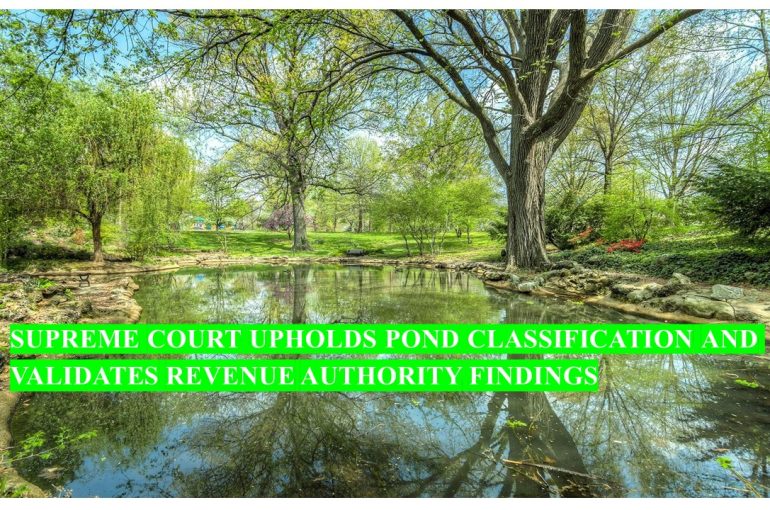SUPREME COURT UPHOLDS POND CLASSIFICATION AND VALIDATES REVENUE AUTHORITY FINDINGS
The Judgment in the Case of Ajay Singh v. Khacheru& Ors., Civil Appeal Nos– of 2025 (Arising out of Special Leave Petition (Civil) Nos. 34407-34408 of 2013) was delivered by a Division Bench of the Supreme Court of India, comprising Hon’ble Justice C.T. Ravikumar and Justice Sanjay Karol, on 2nd January 2025. In this case, the Court addressed the classification and ownership of land recorded as Johad (Pond) in revenue records and examined the validity of a patta relied upon by the Respondents, with implications for the exercise of writ jurisdiction and the interpretation of revenue laws.
Facts:
The dispute concerns Khasra No. 103, recorded as Johad (Pond) in 1970 in revenue records. The Respondent, Khacheru, claimed rights over the land based on a patta allegedly granted in 1981-82, asserting that the land was not a Pond but “Oosar” land. The Appellant, Ajay Singh, contested the claim under Section 198(4) of the U.P. Zamindari Abolition and Land Reforms Act, 1950, asserting that the land was historically a Pond excluded from the consolidation scheme as it served the community as a water reservoir. The Additional District Magistrate/Additional Collector concluded the patta was fictitious, and this decision was upheld by the Additional Commissioner. The Appellant also obtained an ex-parte decree in a civil suit prohibiting interference with the land’s use as a Pond. However, the High Court, in writ jurisdiction, reversed the findings, holding that the land was mistakenly recorded as a Pond.
Issues:
- Whether the disputed land was Johad (Pond) or Oosar (barren land) based on valid evidence.
- Whether the High Court, under its writ jurisdiction could interfere with concurrent findings of fact recorded by revenue authorities and lower courts.
- Whether the patta relied upon by the Respondent was genuine.
Contentions:
Appellant (Ajay Singh):
According to the Appellants, the disputed land was historically a Pond as per revenue records and served the villagers needs. The alleged patta was fictitious, with no supporting evidence in Tehsil records. The findings of the revenue authorities were consistent and based on evidence, which could not be disturbed in writ jurisdiction unless it is perverse.
Respondent (Khacheru):
The Respondents contended that the land was barren and not a Pond. The patta was validly issued, and any inconsistency in records or non-availability of allotment files was beyond the Respondent’s control. The objections raised by the Appellant were time-barred.
Supreme Court:
The Supreme Court held that the High Court erred in interfering with the concurrent findings of fact by the revenue authorities and the Civil Judge. It reiterated that writ jurisdiction under Article 226 is supervisory and does not permit reappreciation of evidence unless the findings are perverse or without jurisdiction. The Court restored the orders of the Additional District Magistrate/Additional Collector, which declared the patta fictitious and upheld the status of the land as a Pond.
Baddam Parichaya Reddy
The Indian Lawyer & Allied Services
Associate





































Leave a Reply